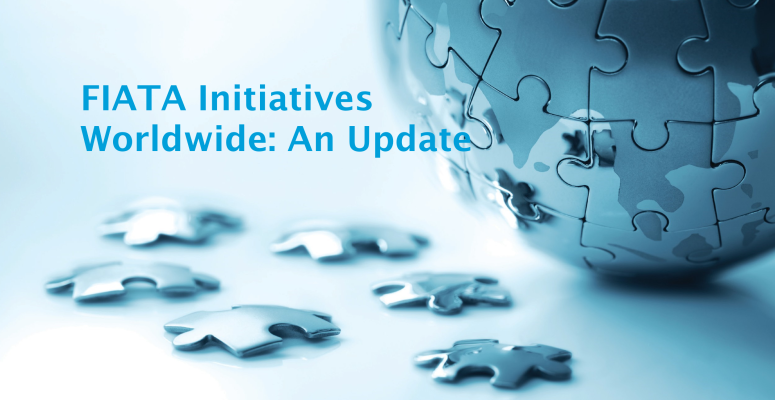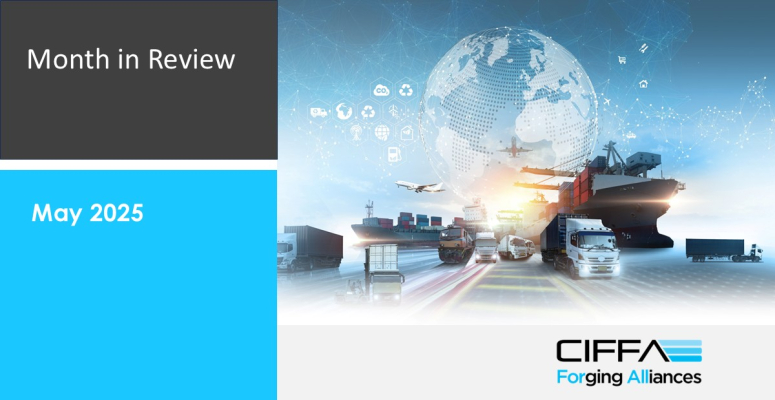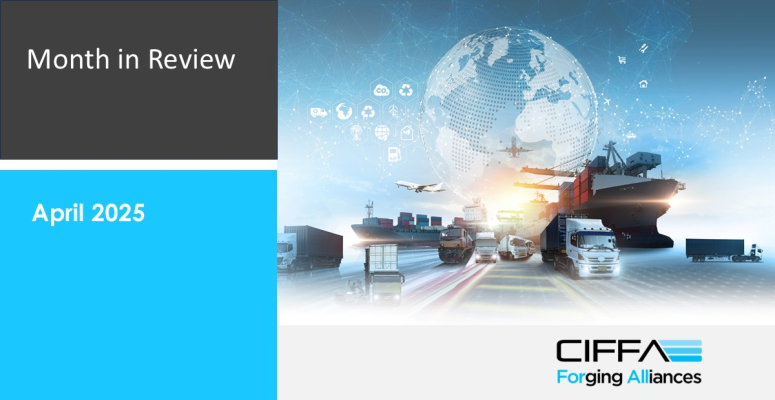
FIATA Initiatives Worldwide: An Update
CIFFA, through its Secretariat, represents the interests of the Canadian Freight Forwarders and actively participates on the various FIATA , (International Federation of Freight Forwarders Associations) Global Institutes and Advisory Bodies.
By Bruce Rodgers, CIFFA Executive Director
As a Regular Freight Forwarder Member firm your membership fees also include Individual Company membership to FIATA. This membership expands some 150 countries, consisting of approximately 5,800 individual members. Its mission objectives are fivefold:
- to unite the freight forwarding industry worldwide.
- to represent, promote and protect the interests of the industry by participating as advisors or experts in meetings of international bodies dealing with transportation.
- to familiarize trade and industry and the public at large with the services rendered by freight forwarders through the dissemination of information, distribution of publications, etc.
- to standardize and improve the quality of services rendered by freight forwarders by developing and promoting uniform forwarding documents, standard trading conditions, etc.
- to assist with vocational training for freight forwarders, liability insurance problems, tools for electronic commerce including electronic data interchange (EDI) and barcode.
The following is a summary of some of the many FIATA initiatives presented during the past year.
For more info on these many initiatives please reach out to admin@ciffa.com.
Airfreight Institute (AFI)
The ACFI held discussions around ACI multiple filing, particularly when reporting shipment data to customs authorities, as per pre-arrival and pre-loading Advance Cargo Information regulations. The Institute reviewed an IATA paper containing draft proposal recommendations to develop a common understanding of the self-filing issue and to establish a protocol for airlines to address it with their supply chain partners, noting the need to prevent duplicative, mismatching, or missing filings.
The AFI discussed whether the WCO (World Customs Organization) should work to develop a generic filing process at the global level, however it was raised that this could risk opening the door to using it as a mechanism to collect penalties and fines. The possibility of considering the mandatory data elements at the WCO level was discussed, linking to Single Window and safety and security data.
Customs Affairs Institute (CAI)
The CAI noted the importance of continuing to reinforce FIATA’s position on customs topics and actively work towards trade facilitation for the benefit of international trade, including by strengthening partnerships with International Organizations.
The committee agreed to work towards the following key priorities for 2021:
- Trade facilitation, which includes E-Commerce, AEO (Authorized Economic Operator) and digitalization
- Coordinated border management
- Illicit trade.
Specific work included:
AEO Validation and Implementation Guidance
During the WCO SAFE review cycle, FIATA noted the contentious aspect of the inclusion of policies on forced labour and social responsibilities such as a code of conduct into the AEO criteria. The committee positioned that those topics go beyond the intended scope of AEO programs whilst possibly excluding small and medium sized enterprises (SMEs) from AEO programs as a result.
Participated on the virtual AEO Conference on the challenges and best practices when exchanging data for the implementation of Mutual Recognition Agreement (MRAs) on AEO programs. FIATA highlighted the need for all countries to have the same opportunities to join the AEO program and for the application to be standardized around the globe. Also commented on the opportunity to modernize and digitalised the process.
WCO Capacity Building Committee
Reviewed a strategic initiative to support members and government worldwide in navigating their implementation of the WCO Trade Facilitation Agreement (TFA), especially through “tailor-made” assistance and capacity building support.
E-Commerce Annual Review
The committee reviewed the different revenue collection approaches cited in the WCO E-Commerce Package and agreed on a buyer-consumer approach as opposed to the intermediary-based approach, as the latter approach was considered to add an undue burden of collection on the freight forwarding process, particularly in the context of e-commerce shipments. In addition, under certain conditions, the absence of commercial relationship between the freight forwarder and the party importing the goods would render the intermediary-based approach impossible.
WCO Permanent Technical Committee
The committee noted that simplified procedures and paperless trade have become the new norm due to the pandemic and the importance to maintain those safeguards going forward. It underlined the importance to ensure that Advance Electronic Information as well as ensuring access that companies of all size can benefit from AEO Programs.
Coordinated Border Management
Coordinated Border Management refers to a coordinated approach by border control agencies, both domestic and international, in the context of seeking greater efficiency in managing trade and travel flows, while maintaining a balance with compliant requirements. FIATA positioned that customs administrations should enact bilateral or multilateral agreements or mutual recognition agreements of customs control. Highlighted the need for common standards and harmonization in terms of data gathering and sharing within the context of Coordinated Border Management.
Multimodal Transport Institute (MTI) – Working Group Sea Transport
Several key themes were identified, based upon the top priorities raised in FIATA’s Freight Forwarding Trade and Transport Survey 2021:
- Further developments related to the disrupted maritime supply chain, and the need to look forward and engage with relevant stakeholders to improve it, notably by suggesting data sharing and data exchange in close coordination with the FIATA digital project.
- Vertical integration of shipping lines in the maritime supply chain and the need to ensure that competition takes place on a same level playing field.
- The importance of demurrage and detention issues as a specific item in itself. Considered the need to continue to observe and identify initiatives of shipping line to use oligopolistic practices to enforce conditions on other stakeholders in the Maritime Supply Chain, such as issues related to the Merchant Clause.
- The need for an improved relationship with shipping lines, and the efforts of the WG Sea to improve dialogue and find common ground, including a recent discussion with the World Shipping Council.
- The situation surrounding container depots in many cities, the fees charged to shippers when they collect empty containers for export, and issues regarding container imbalances and equipment shortages.
- Considered the challenge for freight forwarders to compete with shipping lines on carriers’ haulage.
Spot contract vs. hedging: Freight Forwarders’ management of risk
The committee reviewed the ongoing issues being the unreliable and volatile container shipping market, the rising freight rates, the lack of accountability in terms of contracts and the exacerbation of all of these issues due to the COVID-19 pandemic. Discussed further the topics of spot contract versus hedging, whether forward agreements would be able to guarantee enforceable contracts on which conditions are present and potential digital solutions touching upon these issues. The committee discussed the possible solution to ensure enforceable contracts, that guarantees contract performance through two-way commitments with guaranteed price and service level. Underlined ongoing digital solutions which could aim at solving these issues related to unreliability and non-compliance with contract terms.
Advisory Body on Information Technology (ABIT)
Four key topics have been identified as priorities for ABIT members to focus on this year:
- eFBL Proof of Concept
- Freight-pay platform
- Interoperability project
- Share new technology advances with FIATA members
The scope of the first priority is to test the issuance of digital FBL through different software providers and to test FIATA’s document tracking solution, which will certify the validity of the document, the integrity of its content, as well as the identity of its issuer, through a unique QR code stamped on each document. The initiative started in February and was completed the end of June. The next steps for the balance of this year will be to develop the technology requirements.
The roll-out of the initiative will start in Europe in first quarter 2022 and commence in Canada during the fourth quarter.
Freight-pay platform
Develop a marketing plan that should be very transparent on the costs related to the use of the platform as well as the different transaction fees that will be applied on the platform.
Interoperability project
Provide a benchmark and analysis of existing data-exchange solutions, analysis of FIATA members needs and challenges in terms of data exchange and definition of a solution to facilitate the exchange of data between freight-forwarders and the different actors of the supply chain.
Share new technology advances with FIATA members
Update FIATA members on emerging digital technologies/solutions, help FIATA members to adopt new technologies, support FIATA’s digital strategy by informing members about the relevance of the different projects for their day-to-day business.
Working Group Sustainable Logistics (WGSL)
The seven WGSL work projects, which have been elaborated based on meeting objectives are listed as follows:
- Project 1: A repository of different emissions calculators
- Project 2: Position paper on the logistics contribution to the SDGs
- Project 3: Repository of Best Practices in Logistics Sustainability
- Project 4: Top 10 tips for reducing emissions
- Project 5: A simple and effective emission calculator for FIATA Members
- Project 6: FIATA industry guidance for sustainable logistics
- Project 7: Tool kits for the implementation of a FIATA guidance for sustainable logistics
The project sequence and timeline were emphasized, with a focus on projects one- four to be completed this year. Participants agreed on the importance of communication, i.e., to make the message achievable and understandable was stressed as well as the necessity for FIATA to take a very clear lead on the issue. As regards the emission calculators, the need for didactic material (tutorials, graphic, etc.) was strongly stressed to overcome their complexity.
As described in detail above, there are several global initiatives that are being undertaken to improve the forwarder status and positioning within the global supply chain.
To obtain further information on the developments of these committees, please reach out to admin@ciffa.com.



